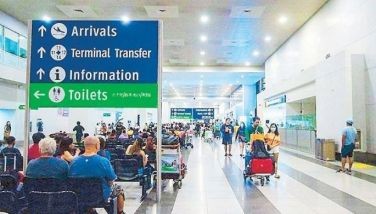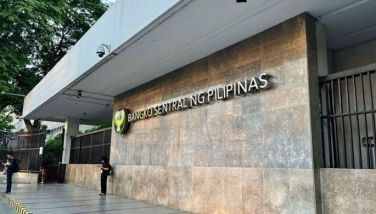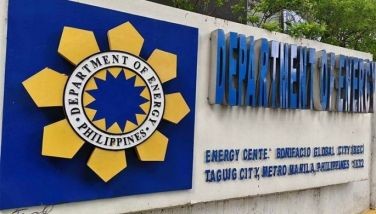DA to file WTO suit vs Australia
June 30, 2006 | 12:00am
The Department of Agriculture (DA) will file a petition against Australia with the director-general of the World Trade Organization (WTO) for blocking the entry of Philippine fresh banana exports.
"The case against Australia has to be pursued to its logical conclusion. We will file it in due time and we are looking at several aspects that will have an impact and help us win our case," said DA officer-in-charge and Undersecretary Segfredo Serrano.
Serrano, who is the country’s chief WTO negotiator for the agriculture sector, said Biosecurity Australia (BA) was supposed to announce the revised draft import risk analysis (IRA) on bananas this June, but it is likely that this will again be postponed for an indefinite period.
BA, the Australian government agency that assesses the risk of disease from imported farm products, reversed two years ago its IRA report that should have finally allowed the importation of bananas from the Philippines following the aggressive lobbying of the Australia Banana Growers Council (ABGC).
"Australian authorities could not give an indicative timeline for releasing the IRA report the last time that they went to the Philippines despite the fact that we have been giving them all the information that they required," said Serrano.
He added that BA, under pressure from the ABGC, are assigning so-called "eminent scientists" to dig deeper into the risk issues raised by Australia’s local banana producers.
Once the Philippine government pursues its unfair trade practices suit against Australia, the WTO will have to create a trade dispute panel that will review the case. Usually, trade rows brought for mediation to the WTO take years to resolve.
Filipino banana exporters want to take advantage of the devastating cyclones that hit Australia’s banana plantations earlier this year. A trade agreement will benefit both countries, especially Australian consumers since banana prices have been steadily rising – an aftermath of the cyclones.
The ABGC which so far has been successful in blocking the entry of bananas from the Philippines, continues to exert pressure on BA and influence its legislators into sidetracking the IRA issue.
The DA consulted the Advocacy Center on WTO Law (ACWL) to determine the best approach in its fruit trade case against Australia before the WTO.
ACWL is a trust fund created by developed countries to help developing countries thresh out their unfair trade complaints before the WTO. ACWL makes its recommendations on trade issues and endorse these to the Agriculture Secretary who will in turn refer it to the Cabinet level for the final decision.
It has been almost four years now since Australia issued the draft IRA blocking the entry of Philippine banana due to reports of a banana disease that could destroy Australia’s banana industry. This has been refuted by both plant experts of the Bureau of Plant Industry and Philippine banana exporting companies.
Local banana exporters have been junking ABGC’s claims, citing the Philippines’ record or the second largest producer and exporter of Cavendish banana in the world. They pointed out that Philippine bananas are accepted in Japan and the US, two countries that have very rigid sanitary and phytosanitary rules.
The industry exported $350 million worth of fresh bananas to various foreign markets in 2005.
The bulk of production is in Davao in Mindanao which accounts for 90 percent of bananas produced for the export market.
"The case against Australia has to be pursued to its logical conclusion. We will file it in due time and we are looking at several aspects that will have an impact and help us win our case," said DA officer-in-charge and Undersecretary Segfredo Serrano.
Serrano, who is the country’s chief WTO negotiator for the agriculture sector, said Biosecurity Australia (BA) was supposed to announce the revised draft import risk analysis (IRA) on bananas this June, but it is likely that this will again be postponed for an indefinite period.
BA, the Australian government agency that assesses the risk of disease from imported farm products, reversed two years ago its IRA report that should have finally allowed the importation of bananas from the Philippines following the aggressive lobbying of the Australia Banana Growers Council (ABGC).
"Australian authorities could not give an indicative timeline for releasing the IRA report the last time that they went to the Philippines despite the fact that we have been giving them all the information that they required," said Serrano.
He added that BA, under pressure from the ABGC, are assigning so-called "eminent scientists" to dig deeper into the risk issues raised by Australia’s local banana producers.
Once the Philippine government pursues its unfair trade practices suit against Australia, the WTO will have to create a trade dispute panel that will review the case. Usually, trade rows brought for mediation to the WTO take years to resolve.
Filipino banana exporters want to take advantage of the devastating cyclones that hit Australia’s banana plantations earlier this year. A trade agreement will benefit both countries, especially Australian consumers since banana prices have been steadily rising – an aftermath of the cyclones.
The ABGC which so far has been successful in blocking the entry of bananas from the Philippines, continues to exert pressure on BA and influence its legislators into sidetracking the IRA issue.
The DA consulted the Advocacy Center on WTO Law (ACWL) to determine the best approach in its fruit trade case against Australia before the WTO.
ACWL is a trust fund created by developed countries to help developing countries thresh out their unfair trade complaints before the WTO. ACWL makes its recommendations on trade issues and endorse these to the Agriculture Secretary who will in turn refer it to the Cabinet level for the final decision.
It has been almost four years now since Australia issued the draft IRA blocking the entry of Philippine banana due to reports of a banana disease that could destroy Australia’s banana industry. This has been refuted by both plant experts of the Bureau of Plant Industry and Philippine banana exporting companies.
Local banana exporters have been junking ABGC’s claims, citing the Philippines’ record or the second largest producer and exporter of Cavendish banana in the world. They pointed out that Philippine bananas are accepted in Japan and the US, two countries that have very rigid sanitary and phytosanitary rules.
The industry exported $350 million worth of fresh bananas to various foreign markets in 2005.
The bulk of production is in Davao in Mindanao which accounts for 90 percent of bananas produced for the export market.
BrandSpace Articles
<
>
- Latest
- Trending
Trending
Latest




























